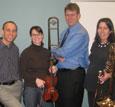The directors at Chaska Middle School West in suburban Minneapolis want to get all 1,000 students fired up about music. Judging by the dizzying array of traditional bands, extra ensembles, and public performances, the energetic staff of four directors at Chaska West is succeeding. As director Scott Prescott puts it, “Music is part of the culture at our school. We have 450 traditional music students but through our programs, all have a chance to participate in music.” New projects for this year include a bluegrass/country group and a radio morning show.
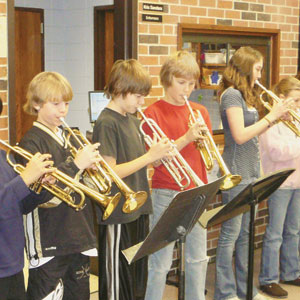
What led you to move beyond band, orchestra, and choir to include other styles of music in the program?
Eric Songer: The starting point was having a strong interest in and enjoyment for that kind of music. I have always loved a wide variety of music, so it was a fun change for me to teach classes that did not involve classical music. Even with the hip-hop academy, I did not start out as a huge fan of the music, but have developed an appreciation for it through extensive listening.
It takes some time to figure out how to run these classes in the best way for your teaching style. I enjoy working in a concert or jazz band setting and teach the rock classes the same way. I will write out charts or buy them, and the group will work through the music in a fairly structured way.
The school of rock started after my wife and I went to see the popular movie of the same name several years ago. By the end of the movie we knew we needed to teach a class like that but with more structure. My wife is a piano and voice teacher and teaches the class with me.
The school of rock was open to anyone who wanted to join, regardless of instrument. We started with about ten students and almost no equipment. We wrote a number of successful grant applications to buy guitars, keyboards, amps, computers, and microphones. We also brought in some local rock artists as clinicians. Eventually we decided to start an auditioned rock band. From there we began the hip hop and mariachi groups, which were born in part out of an effort to get more minority students involved in the music program.
Our newest program is a radio morning show that will start in February. We already have broadcasting equipment that permits us to broadcast throughout the school on closed circuit television and our public address system. We will meet for four or five weeks to discuss how to run a morning show, talk on the air, take phone calls, and run a radio contest. Then students will be on the air once a week starting at 7 a.m. until the school day begins.
What benefits do you see from having so many ensembles and classes?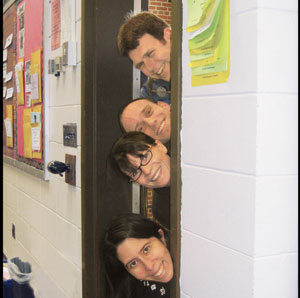
Eric Songer: For those students who are in band, choir, and orchestra, they have even more opportunities to get involved in music. For students who enjoy music less, some of the other classes can provided an unexpected spark. I recall one student who played saxophone but was wavering on whether to continue playing in the concert band. She loved singing in her rock music class. Eventually she grew more enthusiastic about saxophone and became one of the top players in the school and even joined the jazz band. I attribute the change to participating in an after-school program with music she loved.
How did the composer of the month program get started at Chaska Middle School West?
Scott Prescott: With so many initiatives we have attempted, the administration has bent over backwards to help us, and that certainly has been the case with the composer program. We pick a composer and then share information with the entire school about that person and his music. This month we have John Coltrane. In other months the pick might be Brahms or Debussy or even the Keith Richards and Mick Jagger of the Rolling Stones.
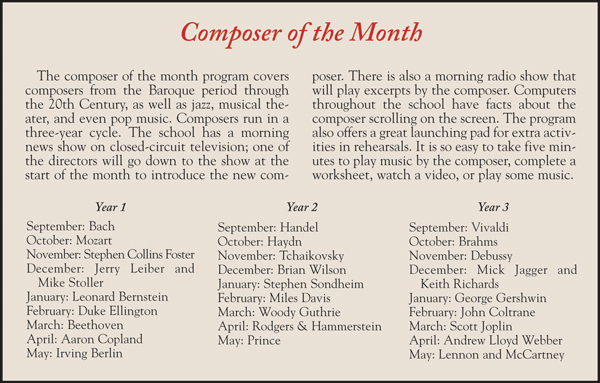
What other projects have you used to keep students interested in music?
Tricia Stolz: We give students various projects and presentations that require internet research. We might tell students to imagine they are news reporters in the 1800s attending the premiere of Beethoven’s Symphony #9. They will work in small groups to develop a presentation for the class. This is a great way for students to learn about composers and look deeper into the history behind music.
Eric Songer: In the band program we give students the opportunity to become composers using various software programs. We might ask students to write a theme and variations or a duet using Finale. At other times we have them use the Garage Band software program to compose a piece in any style they want and incorporate their own instrument. Other popular projects include developing a music history website and organizing a school talent show.
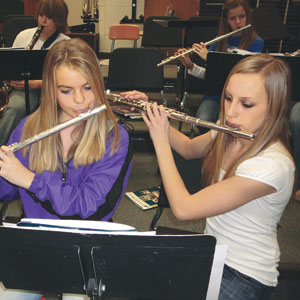
All of the band students start playing in 5th grade, but the orchestra students begin a year later. Why did you make this decision?
Tricia Stolz: When we started the orchestra program three years ago, some of the classroom teachers were concerned about losing more students to pullout lessons, and the band directors were worried that the new program would hurt their enrollment. They had nothing to worry about because the band program is so strong.
In the first year orchestra met outside the school day. We had about 10 players at the time and a few others who started playing a string instrument for the first time. Two of the original string students were top band students looking for a new goal. In the second year, the program met during the school day. The late start in 6th grade is detrimental, but we have grown despite the obstacles. For next year the school board will consider a proposal to start the string program in 5th grade. That change would align the string and band programs.
Scott Prescott: The success of the 5th grade band program has just been remarkable. Some of the 5th grade classes have 80-90% participation in band. Unfor-tunately, there is a big drop-out rate between 5th and 6th grade as students move up to middle school and have the opportunity to pursue a wider range of activities. However, if we can keep a good percentage of the band students in middle school, this provides a good foundation for the entire music program.
What steps have you taken to keep students interested in music when they come to middle school?
Scott Prescott: Our 6th grade band and orchestra classes are short, just 30 minutes each, so students learn to work efficiently. They have two minutes to get ready at the start of rehearsal and then we get down to work.
Tricia Stolz: Moving quickly can sometimes be more difficult in orchestra classes because the instruments are so vulnerable to intonation problems. Today I had three basses that were wildly out of tune and couldn’t allow that to persist in rehearsal.
Eric Songer: We really plan the school year carefull and try to increase the amount of material we cover in method books. I find some students are bored by the review of playing fundamentals at the start of 6th grade, but we spend considerable time working on dynamics, articulations, and commonly missed notes. If students move into 7th grade thinking about dynamics and articulations, we have succeeded.
By 8th grade most of the students have been taking lessons for four years and if you work on dynamics for nine weeks at the start of the year, they will tune you out. I try to come up with innovative projects, some using technology, that help students employ concepts they have learned. Regardless of what projects are assigned, the focus always remains on making great music. Our 8th grade music classes aren’t just having fun with computers.
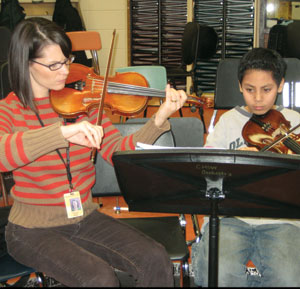 In what ways have you used technology to enhance your program?
In what ways have you used technology to enhance your program?
Eric Songer: Technology comes up in everything we do from lessons to concerts. We even have a music technology class and one part of that is teaching
students how to use moviemaking software. In our rock class we have students make a music video for the unit on the 1980s because that was when MTV started. These skills are also applied to recording many of our 45-50 performances each year.
The rise of podcasts has made it easier to help students when they miss a lesson. Most of our pullout lessons have about ten players at a time. In the past, if one student missed the class, it would have been difficult to make up the session. Now, I can record everything from the lesson, put it on our website, and tell the student, “Go home and listen to me talk to you in your house.” They laugh, but a podcast allows them to get almost the full experience of having a lesson except for receiving direct feedback from me.
How are the pullout lessons handled at Chaska?
Gina Ford: I will pick a day of the week for each section, so the flute players might always get pulled from class on Mondays. I’ll rotate the class period so that students only miss a particular class once a month. Teachers like this approach, but the constantly changing class time can be confusing for students.
Does it cause problems for students to have a different band director for every year of middle school?
Gina Ford: There are pros and cons to this approach, and in some ways, this part of the program is harder on the teachers because you are always learning the names of a new group of students. I do think it is valuable for students to hear different perspectives and ways of having material presented to them. Because all of the music teachers at Chaska work closely together, there is consistency in ideas even if there is a wide variety of teaching approaches.
Eric Songer: When you are a beginning teacher it can take time to find your strengths. It is so common to have a difficult first year in teaching and conclude that things won’t get any better. One of my best skills at a teacher is talking to students about their hobbies and what motivates them. Other teachers may not feel comfortable with that and have greater abilities at meticulously working on a piece of music until it sounds great. The benefit of having such a great team of teachers at Chaska is that students work with directors who share great passion for music even though it is expressed in different ways.
Gina Ford: Sometimes people think I am either crazy or a saint because I enjoy teaching 7th grade so much. Students at that age still have a huge desire to learn new things. When they overcome struggles with playing techniques, the resulting excitement makes it all worth it to me.
Eric Songer: Working with students fires me up every day. I see my job almost as a ministry. We have the ability as teachers to affect so many lives in positive ways and reverse the negative influences of our culture. A number of our students come from broken homes, and I cherish the opportunity to provide a good role model every day. From a musical standpoint, my passion in life is music. Once I had a colleague who noted that he had turned his hobby into a job, and I feel the same way. I love music so much that I sometimes can’t believe it is my profession.
Meet The Directors
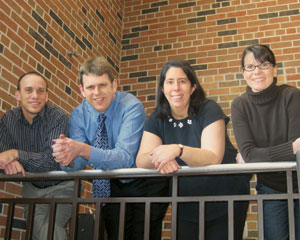
Scott Prescott directs 6th grade concert bands, 6th and 7th grade general music, and the 6th grade jazz ensemble. He has taught at all levels of instrumental music in Minnesota from grades 5-12. He earned a degrees from the University of Minnesota and the University of Michigan.
Eric Songer has taught at Chaska West for 12 years. He earned degrees from the University of Wisconsin-Eau Claire and the University St. Thomas. He is also active as a freelance trombonist and plays in a variety of ensembles in the Twin Cities.
Gina Ford teaches 7th grade band and general music. She has taught for 13 years, including nine at Chaska West. She earned degrees from St. Olaf College and the University of St. Thomas. Ford performs in the Brava Brass Quintet and the Valley Big Band.
Tricia Stolz teaches 6th through 8th grade orchestra, 7th and 8th grade choir, and 8th grade exploratory classes. A Twin Cities native, she earned instrumental and vocal degrees from Luther College and a master’s from Saint Mary’s University.
Photos in this article were taken by Jeanne LaMoore. Dan Blaufuss is managing editor of The Instrumentalist.
